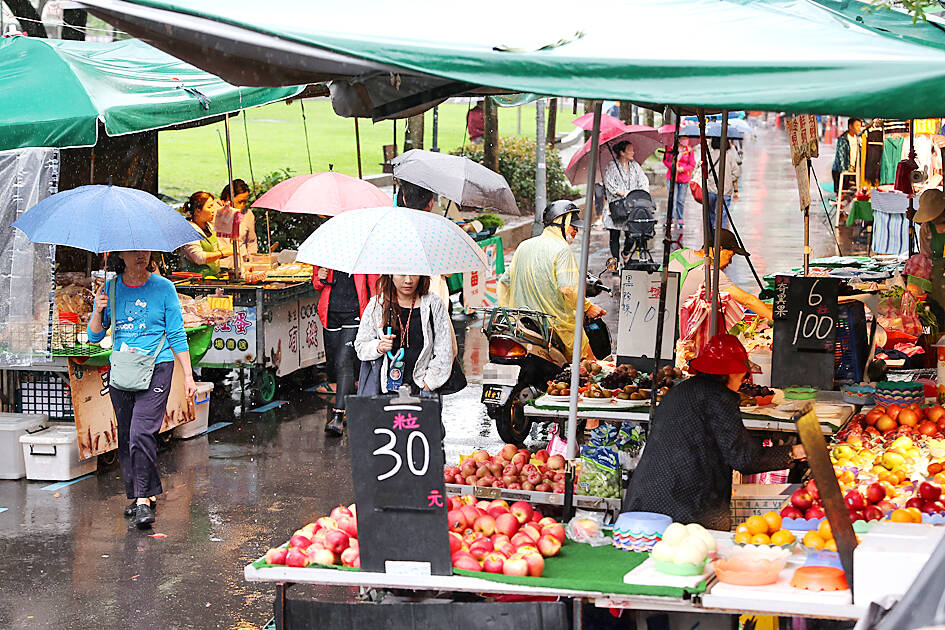The nation’s consumer price index (CPI) increased 2.03 percent year-on-year last month, mainly due to increases in food and fruit prices, as well as dining-out costs, the Directorate-General of Budget, Accounting and Statistics (DGBAS) said yesterday.
It was the second consecutive month that the nation’s CPI surpassed the central bank’s 2 percent target, but the inflationary gauge decelerated from the previous month’s 2.32 percent, the agency’s data showed.
Food prices rose 4.34 percent annually, with the costs of fruit growing 25.26 percent. Meat prices rose 4.46 percent, and those for cereal products such as bread and cakes grew 3.38 percent, the agency said in a report.

Photo: CNA
Dining-out costs grew 3.48 percent from a year earlier, above the 3 percent mark for more than six consecutive months and the highest increase over the past 13 months, the agency said.
As Taiwanese prefer eating out, this still-high spending renders a public perception that consumer prices are still rising, it added.
On a positive note, transportation and communications prices dropped 0.76 percent from a year earlier on the back of a 3.74 percent decrease in international energy prices and a 2.13 percent price fall in communication fees, while rents increased 2.4 percent year-on-year, the smallest increase in the past 12 months, the report said.
Still, inflation for households in the lowest 20 percent of income rose 2.26 percent last month, higher than the 2.09 percent for those with medium income and 1.88 percent for those with the highest 20 percent of income, DGBAS data showed.
Households with lower incomes felt the pinch of rising inflation as food costs comprise a larger share of spending, the agency said.
Core CPI, a more stable long-term price tracker that excludes price-volatile items such as vegetables and oil, last month increased 1.66 percent, below the 2 percent mark for 13 consecutive months, which the agency said was an indication that domestic prices remain stable.
In the first four months of this year, CPI grew 2.15 percent from the same period last year and cumulative core CPI rose 1.64 percent, the report said.
Meanwhile, the producer price index (PPI) last month rose 0.93 percent year-on-year, thanks to price increases in agricultural products, fuel and electronic components, the report said. In the first four months, the cumulative PPI grew 3.02 percent from the same period a year ago, it said.
The DGBAS said it sees no obvious risk of rising prices in Taiwan in the short term due to the US tariff policy and expects the recent surge in the New Taiwan dollar to affect import prices, but the effect on the CPI is expected to emerge in one to two quarters, the agency said.
It is possible that CPI growth would be below 2 percent this month in light of the recent fall in international crude oil prices, it added.

IN THE AIR: While most companies said they were committed to North American operations, some added that production and costs would depend on the outcome of a US trade probe Leading local contract electronics makers Wistron Corp (緯創), Quanta Computer Inc (廣達), Inventec Corp (英業達) and Compal Electronics Inc (仁寶) are to maintain their North American expansion plans, despite Washington’s 20 percent tariff on Taiwanese goods. Wistron said it has long maintained a presence in the US, while distributing production across Taiwan, North America, Southeast Asia and Europe. The company is in talks with customers to align capacity with their site preferences, a company official told the Taipei Times by telephone on Friday. The company is still in talks with clients over who would bear the tariff costs, with the outcome pending further

A proposed 100 percent tariff on chip imports announced by US President Donald Trump could shift more of Taiwan’s semiconductor production overseas, a Taiwan Institute of Economic Research (TIER) researcher said yesterday. Trump’s tariff policy will accelerate the global semiconductor industry’s pace to establish roots in the US, leading to higher supply chain costs and ultimately raising prices of consumer electronics and creating uncertainty for future market demand, Arisa Liu (劉佩真) at the institute’s Taiwan Industry Economics Database said in a telephone interview. Trump’s move signals his intention to "restore the glory of the US semiconductor industry," Liu noted, saying that

NEGOTIATIONS: Semiconductors play an outsized role in Taiwan’s industrial and economic development and are a major driver of the Taiwan-US trade imbalance With US President Donald Trump threatening to impose tariffs on semiconductors, Taiwan is expected to face a significant challenge, as information and communications technology (ICT) products account for more than 70 percent of its exports to the US, Chung-Hua Institution for Economic Research (CIER, 中華經濟研究院) president Lien Hsien-ming (連賢明) said on Friday. Compared with other countries, semiconductors play a disproportionately large role in Taiwan’s industrial and economic development, Lien said. As the sixth-largest contributor to the US trade deficit, Taiwan recorded a US$73.9 billion trade surplus with the US last year — up from US$47.8 billion in 2023 — driven by strong

STILL UNCLEAR: Several aspects of the policy still need to be clarified, such as whether the exemptions would expand to related products, PwC Taiwan warned The TAIEX surged yesterday, led by gains in Taiwan Semiconductor Manufacturing Co (TSMC, 台積電), after US President Donald Trump announced a sweeping 100 percent tariff on imported semiconductors — while exempting companies operating or building plants in the US, which includes TSMC. The benchmark index jumped 556.41 points, or 2.37 percent, to close at 24,003.77, breaching the 24,000-point level and hitting its highest close this year, Taiwan Stock Exchange (TWSE) data showed. TSMC rose NT$55, or 4.89 percent, to close at a record NT$1,180, as the company is already investing heavily in a multibillion-dollar plant in Arizona that led investors to assume